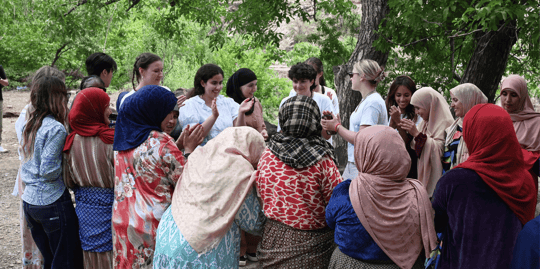The Mountain Songs of Aghbar Dancing Between Roots and Hope

During my journey to Aghbar, nestled high in Morocco’s rugged mountains, I witnessed a piece of living heritage that filled my heart with warmth and a touch of longing for my own homeland. The villagers welcomed us in the most genuine way not with mere handshakes, but with songs, drums, and the thunder of clapping hands that echoed through the narrow mountain paths.
I still see the men, draped in their long, white jalabias, standing tall and proud. Around their shoulders, they wrapped bands of green and red, the colors of the Moroccan flag symbols of resilience and unity woven into fabric. They carried simple yet powerful instruments, hand drums, bendirs, and sometimes even flutes carved from local wood. Their songs rose and fell like the mountain winds, strong yet tender.
Beside them, the women stood in circles, their voices weaving another layer of music into the evening air. They sang and let out that sharp, whirring sound “yiiiiliiiiiliiiiii!” a piercing ululation that I know too well, though I do not know its name in Tamazight or Arabic. We do it too, in my country, especially at weddings. It is a sound that crosses borders East or West, North or South carrying the same meaning joy, pride, and the celebration of life.
When the men danced, stepping in rhythm, stamping their feet on the earth that has fed their ancestors for centuries, the women’s ululations pushed them forward, as if blessing each step. My friends and I joined them, laughing, trying to copy the sounds and the movements. For a moment, we were not outsiders, we were sisters and brothers of the drum. In those voices, I heard the echoes of my own roots, far away yet suddenly so close. It reminded me of the home of my people, of our dances, our fires, our gatherings that keep us alive.
But while the songs and dances bind them together, the daily life in these mountains is a struggle that songs alone cannot solve. I saw families living in tents made of tarps and old blankets. Some have been there for years, their houses lost to storms or poverty. The mountains are beautiful but harsh the nearest hospital is hours away. For a pregnant woman ready to give birth, the only hope is to travel all the way to Marrakech if she can afford the journey.
Water, too is precious and scarce. I was moved by the efforts of the High Atlas Foundation (HAF), which built a water infrastructure that brings clean water closer to these remote villages. It is a gift of life because without water, how do you wash clothes, cook food, bathe your children? How do you grow a small garden when the rains fail? I pray there will be more projects like this, so that every child in these mountains can drink clean water without walking miles every day.
Yet, as much as the villagers help themselves singing, planting, welcoming strangers with full hearts there are things they cannot change alone. It is an injustice that some families still sleep under torn tents while governments look the other way.
Once, these families had roofs over their heads now they have nothing but plastic sheets flapping in the wind. It is not enough to celebrate their culture with tourists and praise their traditions in brochures — they deserve real action, better roads, safe homes, clinics nearby, and schools for their children.
When I danced and ululated beside the women of Aghbar, I felt hope and sorrow at once. Hope, because the community can never be destroyed as long as there is music and open hands. Sorrow, because the world often forgets the people who live closest to the sky.
If we care about justice, we must care about the mountains too. We must fight for water, for roofs, for mothers and children who deserve to be born and grow strong in their own village. We must clap our hands not only for dances, but for action so that the spirit of Aghbar can thrive, not just survive.